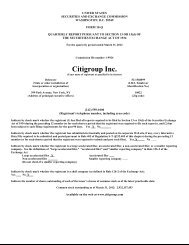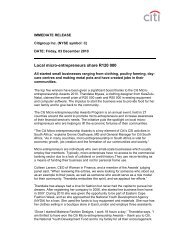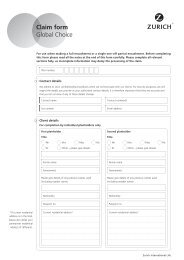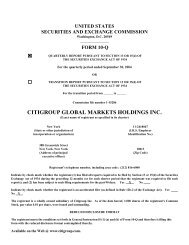Citigroup Inc.
Citigroup Inc.
Citigroup Inc.
Create successful ePaper yourself
Turn your PDF publications into a flip-book with our unique Google optimized e-Paper software.
Repurchase and Resale AgreementsSecurities sold under agreements to repurchase (repos) and securitiespurchased under agreements to resell (reverse repos) generally do not constitutea sale for accounting purposes of the underlying securities, and so are treated ascollateralized financing transactions. As set out in Note 26 to the ConsolidatedFinancial Statements, the Company has elected to apply fair value accountingto a majority of such transactions, with changes in fair value reported inearnings. Any transactions for which fair value accounting has not been electedare recorded at the amount of cash advanced or received plus accrued interest.Irrespective of whether the Company has elected fair value accounting, interestpaid or received on all repo and reverse repo transactions is recorded in Interestexpense or Interest revenue at the contractually specified rate.Where the conditions of ASC 210-20-45-11, Balance Sheet—Offsetting:Repurchase and Reverse Repurchase Agreements, are met, repos andreverse repos are presented net on the Consolidated Balance Sheet.The Company’s policy is to take possession of securities purchased underagreements to resell. The market value of securities to be repurchased andresold is monitored, and additional collateral is obtained where appropriateto protect against credit exposure.As described in Note 25 to the Consolidated Financial Statements, theCompany uses a discounted cash flow technique to determine the fair valueof repo and reverse repo transactions.Repurchase and Resale Agreements, and SecuritiesLending and Borrowing Agreements Accounted foras SalesWhere certain conditions are met under ASC 860-10, Transfers and Servicing(formerly FASB Statement No. 166, Accounting for Transfers of FinancialAssets), the Company accounts for certain repurchase agreements andsecurities lending agreements as sales. The key distinction resulting in theseagreements being accounted for as sales is a reduction in initial marginor restriction in daily maintenance margin. At December 31, 2010 andDecember 31, 2009, $0.2 billion and $13.0 billion of these transactions,respectively, were accounted for as sales that reduced trading account assets.<strong>Inc</strong>luded in the December 31, 2009 amount is $5.7 billion of repurchase andsecurities lending agreements that were accounted for as sales in error. As ofDecember 31, 2009, this error constituted 0.3% of Total assets, 0.3% of Totalliabilities and 3.7% of Federal funds purchased and securities loaned orsold under agreements to repurchase. There was no impact on Net income(loss) in any period. Management believes that this error was immaterial to<strong>Citigroup</strong>’s financial statements during all periods at issue. Commencingin the first quarter of 2010, the Company has prospectively changed theaccounting for these repurchase and securities lending transactions so thatthe accounting reflects a secured borrowing transaction, thus conforming theaccounting to the transaction terms.LoansLoans are reported at their outstanding principal balances net of anyunearned income and unamortized deferred fees and costs except thatcredit card receivable balances also include accrued interest and fees. Loanorigination fees and certain direct origination costs are generally deferredand recognized as adjustments to income over the lives of the related loans.As described in Note 26 to the Consolidated Financial Statements, Citi haselected fair value accounting for certain loans. Such loans are carried at fairvalue with changes in fair value reported in earnings. Interest income onsuch loans is recorded in Interest revenue at the contractually specified rate.Loans for which the fair value option has not been elected are classifiedupon origination or acquisition as either held-for-investment or held-for-sale.This classification is based on management’s initial intent and ability withregard to those loans.Loans that are held-for-investment are classified as Loans, net ofunearned income on the Consolidated Balance Sheet, and the relatedcash flows are included within the cash flows from investing activitiescategory in the Consolidated Statement of Cash Flows on the line Changein loans. However, when the initial intent for holding a loan has changedfrom held-for-investment to held-for-sale, the loan is reclassified to held-forsale,but the related cash flows continue to be reported in cash flows frominvesting activities in the Consolidated Statement of Cash Flows on the lineProceeds from sales and securitizations of loans.Substantially all of the Consumer loans sold or securitized by <strong>Citigroup</strong>are U.S. prime residential mortgage loans or U.S. credit card receivables. Thepractice of the U.S. prime mortgage business has been to sell substantiallyall of its loans except for non-conforming adjustable rate loans. U.S. primemortgage conforming loans are classified as held-for-sale at the timeof origination. The related cash flows are classified in the ConsolidatedStatement of Cash Flows in the cash flows from operating activities categoryon the line Change in loans held-for-sale.Prior to the adoption of SFAS 166/167 in 2010, U.S. credit cardreceivables were classified at origination as loans-held-for-sale to the extentthat management did not have the intent to hold the receivables for theforeseeable future or until maturity. Prior to 2010, the U.S. credit cardsecuritization forecast for the three months following the latest balancesheet date, excluding replenishments, was the basis for the amount of suchloans classified as held-for-sale. Cash flows related to U.S. credit card loansclassified as held-for-sale at origination or acquisition are reported in thecash flows from operating activities category on the line Change in loansheld-for-sale.161
















